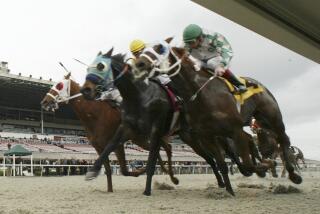Proposal on Lottery Pact Withdrawn : Gambling: State director says talks with computer firm have stalemated over money.
SACRAMENTO — In a last-minute decision Thursday, state lottery Director Sharon Sharp withdrew a recommendation for a one-year contract extension with computer giant GTECH, saying negotiations had bogged down over financial issues.
Sharp said talks would continue and denied that a controversy over the company’s role in a Capitol corruption case had any bearing on her decision to back off the recommendation. GTECH operates the lottery’s computer-assisted games--currently Super Lotto and Decco.
“We pulled back because we simply didn’t have a deal,” she said.
She said she expected to come back to the state Lottery Commission with a new recommendation on the contract in January. If the impasse continues, she said, she could open the contract to competitive bidding, although she acknowledged the lottery was ill-prepared to do that. She said the agency does not have enough time or staff to prepare for a complicated bidding procedure.
Sharp declined to say which contract issues were still unresolved, although she did say the lottery was trying to negotiate more favorable terms.
The Rhode Island-based company has been operating the lottery’s computer games under a contract that has been extended twice. If the company and the lottery are able to reach agreement, the newest extension would run from October, 1992, to October, 1993.
GTECH’s name surfaced in the Capitol corruption investigation when former state Sen. Alan Robbins said he took a $13,500 bribe from GTECH’s lobbyist in exchange for help in defeating a 1986 lottery bill. The San Fernando Valley Democrat, who pleaded guilty this week to tax evasion and racketeering charges, told a federal judge the payment came in the form of a political contribution from the company.
Company officials have denied any wrongdoing, saying they depended on their lobbyist to direct their political contributions.
Asked why she had not delayed the negotiations until federal prosecutors concluded an investigation, Sharp said, “Whatever happened to that little old adage you’re not guilty until proven so?”
Sharp said the company’s contract with the lottery has come up for renewal at a time when financial troubles have forced the state agency to cut back drastically on staff and expenses.
On Thursday, despite objections from state Controller Gray Davis, the commission voted 3 to 1 to withhold $7 million in interest payments from state schools to use the money to boost the prize pools. Sharp said the move was intended to attract more players to the games of chance and increase sales enough to offset the loss to the schools.
But Davis said he was inclined to block the move on the advice of his attorneys, who contend it was the intent of the lottery initiative that any additional revenues be given to schools. Attorneys for the lottery said they believed the commission had the legal right to determine how interest income would be spent.
Davis said he would give the lottery an opportunity “to make its case” before he decides. As controller, Davis would physically transfer the money.
Davis said he thinks it would be more appropriate for the lottery to seek a change in the law to permit it to use interest money to boost prizes. He said he would not oppose such a change.
By law, schools must be allotted at least 34% of the lottery’s sales. Before those earnings are forwarded to the schools, however, they are held in banks where they earn interest.
The lottery’s financial problems also prompted a decision by the commission to approve Sharp’s recommendation for a $19.5-million cut in administrative expenses, including the elimination of 100 jobs.
Sharp said she hoped to avoid layoffs and to handle the job cuts through attrition. Other major reductions were in promotion and advertising.
Sharp said the cuts were necessary because the lottery this year has not met its initial revenue projections. Last summer, lottery officials had predicted sales for the year would be $2 billion, but if current sales trends continue Sharp said the lottery will only earn $1.5 billion.
More to Read
Sign up for Essential California
The most important California stories and recommendations in your inbox every morning.
You may occasionally receive promotional content from the Los Angeles Times.










